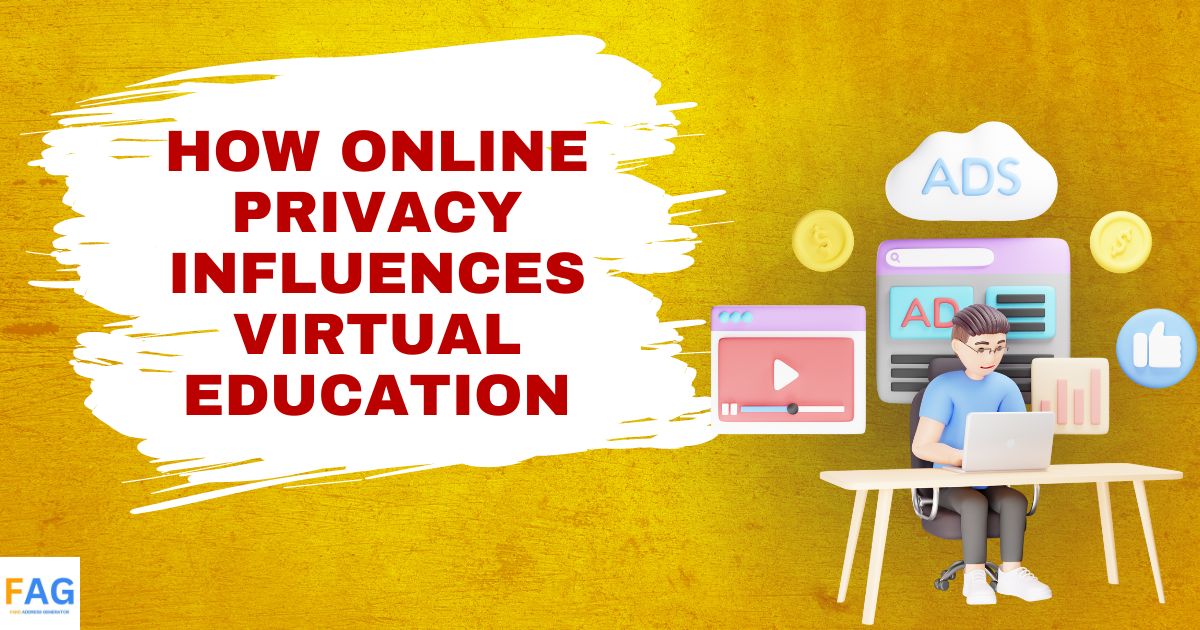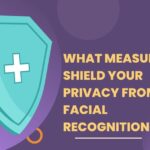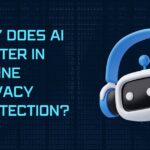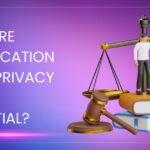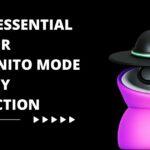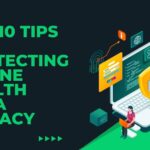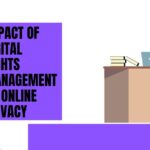Higher education has increasingly embraced virtual education in recent years, and the COVID-19 pandemic has further accelerated its adoption. With online learning, learners can access a vast array of learning opportunities and educational content from anywhere in the world, allowing educators to reach a wider audience. However, as virtual education becomes more prevalent, privacy concerns have emerged.
Privacy issues related to data privacy are a critical concern that affects everyone who uses the internet, and virtual education is no exception. Students, teachers, and parents all need to be aware of the risks associated with online learning and take steps to protect their personal information. For example, students may be required to provide personal information such as their name, address, and date of birth when signing up for online courses. This information can be used by cybercriminals to steal identities or commit fraud.
In addition to the risks associated with personal information, virtual education can also be vulnerable to cyber-attacks. Hackers can target learning management systems to gain access to sensitive information, disrupt classes, or steal intellectual property. As a result, it is essential that virtual education providers take steps to enhance their platforms’ security and privacy and protect their users’ data. By doing so, they can ensure that students can continue to learn in a safe and secure environment.
| Statistical Data | Description | Source |
|---|---|---|
| 72% | Students who are concerned about their privacy in online learning environments. | EdTech Magazine |
| 65% | Educators who believe privacy concerns can affect student engagement. | Education Week |
| 58% | Students who have experienced or are aware of data breaches in their educational platforms. | Cybersecurity Insights |
| 80% | Educational institutions that have increased their cybersecurity measures since moving to virtual learning. | Higher Ed Security Report |
| 47% | Students who prefer online learning despite privacy concerns, due to its flexibility and accessibility. | Student Education Trends Survey |
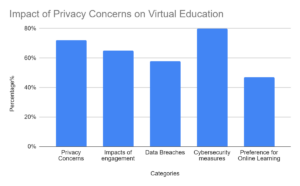
The Role of Online Privacy in Virtual Education
Online privacy plays a crucial role in virtual education, as it helps protect the personal information of students, teachers, and parents. In the digital age, with the adoption of new technologies in education, it is crucial to ensure that personal data is not misused or shared without explicit consent.
One of the main concerns in virtual education is data breaches, which can lead to identity theft and other forms of cybercrime. Schools and online education platforms must take steps to secure their information technology systems and protect sensitive information. This includes implementing strong passwords, encryption, and firewalls, as well as regularly updating software and conducting security audits.
Another important aspect of online privacy in virtual education is the use of student data for targeted advertising. Online education platforms must ensure that student data is not used for commercial purposes and that any third-party partners are fully vetted and comply with relevant privacy laws and regulations.
In addition to protecting personal data, online privacy also plays a role in maintaining a safe and respectful learning environment. Students must feel comfortable expressing themselves and sharing their opinions without fear of harassment or discrimination. Online education platforms must have clear policies and procedures in place to address instances of cyberbullying or other forms of online harassment.
Overall, online privacy is a critical component of virtual education and must be carefully considered and implemented to ensure the safety and security of all involved.
Data Protection Laws and Regulations
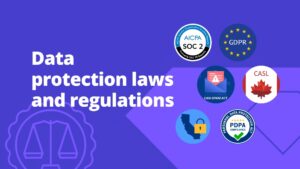
As virtual education continues to expand, there is an increasing need for data protection laws and regulations to ensure the privacy of students and their information. Two important regulations that govern data protection in virtual education are GDPR and FERPA.
GDPR and Virtual Education
The General Data Protection Regulation (GDPR) is a regulation in the European Union that governs data protection and privacy. It applies to all organizations that process the personal data of individuals in the EU, regardless of where the organization is located. In the context of virtual education, GDPR applies to any organization that processes the personal data of EU citizens, including students and teachers.
Under GDPR, organizations must obtain explicit consent from individuals before processing their personal data. They must also implement appropriate technical and organizational measures to ensure the security of the data and prevent unauthorized access or disclosure. Additionally, individuals have the right to access and control their personal data, including the right to erasure (the “right to be forgotten”).
FERPA in Online Learning Environments
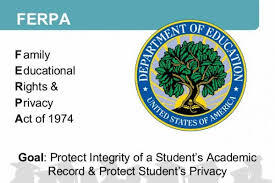
FERPA, or the Family Educational Rights and Privacy Act, is a federal law in the United States that governs the privacy of student education records. FERPA applies to any higher education institution that receives federal funding, including those providing virtual education.
Under FERPA, schools must obtain written consent from parents or eligible students before disclosing any personally identifiable information from a student’s education record. Schools must also implement reasonable measures to ensure the security of education records and prevent unauthorized access or disclosure. Additionally, parents and eligible students have the right to access and control education records, including the right to request amendment of records that they believe to be inaccurate or misleading.
In summary, GDPR and FERPA are two important regulations that govern data protection in virtual education. Organizations that provide virtual education must comply with these regulations to ensure the privacy and security of students’ personal information.
Privacy Challenges in E-Learning Platforms
As online education continues to expand, privacy concerns have become more pressing. E-learning platforms collect a vast amount of data about their users, and it is essential to ensure that this data is collected, stored, and used in a secure and ethical manner. This section will discuss two of the most significant privacy challenges facing e-learning platforms: data collection and usage and third-party access and data sharing.
Data Collection and Usage
One of the primary concerns with e-learning platforms is the amount of data they collect about their users. This data can include personal information such as name, address, and email, as well as more sensitive information such as browsing history, search queries, and even biometric data. While some of this data is necessary to provide a personalized learning experience, it is crucial to ensure that it is collected and used in a way that respects user privacy.
To address this challenge, e-learning platforms must be transparent about what data they collect and how they use it. They should provide clear and concise privacy policies that explain how user data is collected, stored, and used. Additionally, they should provide users with options to control their data, such as the ability to delete their accounts or opt out of certain data collection practices.
Third-Party Access and Data Sharing
Another significant challenge facing e-learning platforms is third-party access and data sharing. Many e-learning platforms use third-party services such as analytics tools, advertising networks, and social media platforms to enhance their offerings. While these services can provide valuable insights and features, they can also pose a significant privacy risk.
To mitigate this risk, e-learning platforms must carefully vet their third-party partners and ensure that they have robust data protection policies in place. They should also limit the amount of data they share with third parties and ensure that users are aware of any data-sharing practices. Additionally, e-learning platforms should consider using open-source tools and services to reduce their reliance on third-party providers.
In summary, e-learning platforms face significant privacy challenges as they collect and use large amounts of user data. To address these challenges, they must be transparent about their data collection practices, provide users with control over their data, carefully vet third-party partners, and limit data sharing practices.
Best Practices for Protecting Privacy
When it comes to virtual education, protecting privacy is of the utmost importance. Online learning platforms collect and store a significant amount of personal data, crucial for the process of teaching and learning, including student names, addresses, and academic records. Therefore, it’s crucial to implement best practices to safeguard this sensitive information.
Implementing Strong Authentication Methods
One of the most effective ways to protect privacy is by implementing strong authentication methods. This includes requiring students and teachers to use complex passwords that are changed regularly and enabling two-factor authentication. Two-factor authentication adds an extra layer of security by requiring users to provide two forms of identification, such as a password and a fingerprint scan.
Additionally, schools should ensure that all online learning platforms they use are compliant with data protection regulations, such as the Family Educational Rights and Privacy Act (FERPA) and the Children’s Online Privacy Protection Act (COPPA). These regulations require that schools obtain parental consent before collecting any personal information from students under the age of 13.
Regular Privacy Audits and Training
Regular privacy audits and pieces of training are also crucial for protecting privacy in virtual education. Schools should conduct regular audits of their online learning platforms to ensure that they are using the latest security measures and that all personal data is being stored securely.
Furthermore, schools should provide regular privacy training to teachers and staff to ensure that they are aware of the latest threats and best practices for protecting student data. This includes educating them on how to identify phishing scams, how to create strong passwords, and how to report any suspicious activity.
By implementing strong authentication methods and conducting regular privacy audits and training, schools can ensure that their student’s personal data is protected and that they are compliant with all relevant data protection regulations.
Impact on Student Behavior and Performance
The shift to virtual education has brought about significant changes in student behavior and performance. Online privacy plays a crucial role in shaping these changes. In this section, we will discuss the impact of online privacy on student engagement and learning outcomes.
Influence on Student Engagement
Online privacy concerns can affect student engagement in virtual learning environments. According to a study by Frontiers in Education, students reported decreases in live lecture engagement and participation in online discussions during the COVID-19 pandemic. This decrease in engagement can be attributed to concerns about online privacy, such as the fear of being monitored or recorded without consent.
To mitigate these concerns, educators can take steps to ensure that students’ privacy is protected. For example, they can use secure video conferencing tools, provide clear guidelines on data collection and sharing, and offer alternative participation options for students who are uncomfortable with certain online activities.
Effects on Learning Outcomes
Online privacy can also significantly impact the learning process and subsequent outcomes for students. A study by Penn Today found that the switch to online teaching during the pandemic had a negative impact on student performance. However, the study also found that if instructors used active learning techniques, such as interactive quizzes and group discussions, students were more engaged, and learning outcomes improved.
To ensure that online privacy concerns do not negatively impact learning outcomes, educators can provide students with clear guidelines on data collection and sharing. They can also use secure online tools and platforms that protect students’ privacy while still allowing for active learning and engagement.
Overall, online privacy concerns can have a significant impact on student behavior and performance in virtual learning environments. Educators must take steps to address these concerns and ensure that student’s privacy is protected while still providing engaging and effective virtual learning experiences.
References:
- Engagement in Online Learning: Student Attitudes and Behavior During the COVID-19 Pandemic
- Online learning’s impact on student performance
Frequently Asked Questions
What measures can institutions take to protect student privacy in virtual education?
Institutions can take several measures to protect student privacy in virtual education. They can ensure that the online learning platform is secure and complies with data protection laws. They can also limit the amount of personal information collected from students and ensure that it is stored securely. Additionally, institutions can provide students with clear and concise information about their privacy rights and how their personal information will be used.
How do data protection laws apply to online learning platforms?
Data protection laws apply to online learning platforms in the same way they apply to any other online service. Institutions must comply with data protection laws such as the General Data Protection Regulation (GDPR) and the Family Educational Rights and Privacy Act (FERPA) when collecting, storing, and using student data. These laws require institutions to obtain consent from students before collecting their personal information and to ensure that it is stored securely.
What are the implications of data breaches in virtual education settings?
Data breaches in virtual education settings can have serious implications for student privacy. They can result in the theft of personal information such as names, addresses, and social security numbers. This information can be used for identity theft and other types of fraud. Additionally, data breaches can damage the reputation of the institution and result in legal and financial consequences.
How can students safeguard their personal information when engaging in online learning?
Students can safeguard their personal information when engaging in online learning by being cautious about the information they share. They should only provide the minimum amount of personal information necessary and ensure that they are using a secure connection when accessing the online learning platform. Additionally, students should use strong passwords and enable two-factor authentication to protect their accounts.
In what ways does virtual education pose unique challenges to privacy compared to traditional classrooms?
Virtual classrooms pose unique challenges to privacy compared to traditional classroom settings because they involve the collection and storage of large amounts of personal data. Online learning platforms collect data on student performance, behavior, and engagement, which can be used to make decisions about their academic progress. Additionally, virtual education may involve the use of third-party tools and services, which can increase the risk of data breaches and other privacy violations.
What role does encryption play in securing online educational environments?
In computer science, encryption plays a crucial role in securing online educational environments. It ensures that data transmitted between the student and the online learning platform is secure and cannot be intercepted by unauthorized parties. Encryption also protects data stored on the online learning platform from unauthorized access. Institutions should ensure that their online learning platform uses strong encryption protocols to protect student data.
